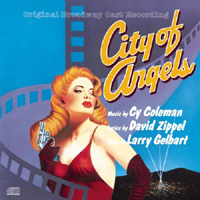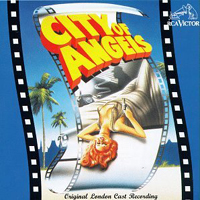 Original Broadway Cast, 1990 (Columbia/Sony)
Original Broadway Cast, 1990 (Columbia/Sony)  (5 / 5) Cy Coleman’s blending of 1940s musical styles — swing, blues, film noir soundtrack, and more — with David Zippel’s deft and witty lyrics helped make City of Angels one of the best musicals of the 1980s. This excellent recording preserves Billy Byers’ hot orchestrations and the performances of an almost ideal cast. Gregg Edelman’s rich, rangy baritone is exciting in the songs written for author/screenwriter Stine; René Auberjonois finds plenty of oily comedy in the role of Buddy Fidler, flim-flam film producer extraordinaire; and Scott Waara’s smooth tones are ideal for radio crooner Jimmy Powers. Rachel York as Mallory and Dee Hoty as Alaura both give dynamic performances, but Hoty is hampered by the exclusion from the recording of one of her big numbers. The major standouts are the show’s Tony winners: James Naughton’s easygoing manner and voice are just right for film detective Stone; and Randy Graff, playing two “Girl Friday”-type secretaries, walks away with the show’s brashest and funniest number, “You Can Always Count on Me.” The Naughton-Edelman duet “You’re Nothing Without Me” is another highlight. Only Kay McClelland, playing both Stine’s wife and Stone’s longtime flame, is just adequate, although her two songs — “It Needs Work” and the torchy “With Every Breath I Take” — are well written. The cast album’s most significant flaw is the omission of much material that would have balanced the characters and illuminated the show’s razor-sharp humor. Still, this is an essential recording of a top-notch Coleman score. Don’t stop listening until “Double Talk Walk,” some of Broadway’s best-ever exit music, has finished playing. — Matthew Murray
(5 / 5) Cy Coleman’s blending of 1940s musical styles — swing, blues, film noir soundtrack, and more — with David Zippel’s deft and witty lyrics helped make City of Angels one of the best musicals of the 1980s. This excellent recording preserves Billy Byers’ hot orchestrations and the performances of an almost ideal cast. Gregg Edelman’s rich, rangy baritone is exciting in the songs written for author/screenwriter Stine; René Auberjonois finds plenty of oily comedy in the role of Buddy Fidler, flim-flam film producer extraordinaire; and Scott Waara’s smooth tones are ideal for radio crooner Jimmy Powers. Rachel York as Mallory and Dee Hoty as Alaura both give dynamic performances, but Hoty is hampered by the exclusion from the recording of one of her big numbers. The major standouts are the show’s Tony winners: James Naughton’s easygoing manner and voice are just right for film detective Stone; and Randy Graff, playing two “Girl Friday”-type secretaries, walks away with the show’s brashest and funniest number, “You Can Always Count on Me.” The Naughton-Edelman duet “You’re Nothing Without Me” is another highlight. Only Kay McClelland, playing both Stine’s wife and Stone’s longtime flame, is just adequate, although her two songs — “It Needs Work” and the torchy “With Every Breath I Take” — are well written. The cast album’s most significant flaw is the omission of much material that would have balanced the characters and illuminated the show’s razor-sharp humor. Still, this is an essential recording of a top-notch Coleman score. Don’t stop listening until “Double Talk Walk,” some of Broadway’s best-ever exit music, has finished playing. — Matthew Murray
 Original London Cast, 1993 (RCA)
Original London Cast, 1993 (RCA)  (2 / 5) With almost every important musical moment of City of Angels captured, and enough of Larry Gelbart’s incisive dialogue included to set the scenes, this is the kind of recording that should have been made of the original Broadway production. Unfortunately, the performances here leave much to be desired, with most of the cast over-emoting in both speech and song. Henry Goodman, superb as Buddy, makes this work only because his character is so far over-the-top to begin with. The style feels far less organic to the other performances, with Roger Allam a particularly uncomfortable Stone and Susannah Fellows (Alaura), Fiona Hendley (Gabbi/ Bobbi), and Haydn Gwynne (Oolie/Donna) doing little better. Martin Smith keeps his Stine grounded, but his 11-o’clock number, “Funny,” is a restrained disappointment here. Even if the cast’s problems with American accents and 1940s speech patterns come through, this recording’s more thorough documentation of the score makes it useful as a companion, if not a substitute, for the otherwise superior Broadway recording. — M.M.
(2 / 5) With almost every important musical moment of City of Angels captured, and enough of Larry Gelbart’s incisive dialogue included to set the scenes, this is the kind of recording that should have been made of the original Broadway production. Unfortunately, the performances here leave much to be desired, with most of the cast over-emoting in both speech and song. Henry Goodman, superb as Buddy, makes this work only because his character is so far over-the-top to begin with. The style feels far less organic to the other performances, with Roger Allam a particularly uncomfortable Stone and Susannah Fellows (Alaura), Fiona Hendley (Gabbi/ Bobbi), and Haydn Gwynne (Oolie/Donna) doing little better. Martin Smith keeps his Stine grounded, but his 11-o’clock number, “Funny,” is a restrained disappointment here. Even if the cast’s problems with American accents and 1940s speech patterns come through, this recording’s more thorough documentation of the score makes it useful as a companion, if not a substitute, for the otherwise superior Broadway recording. — M.M.

